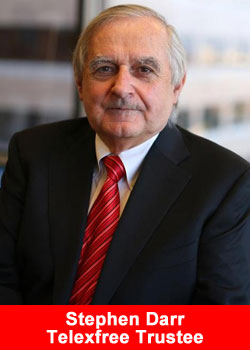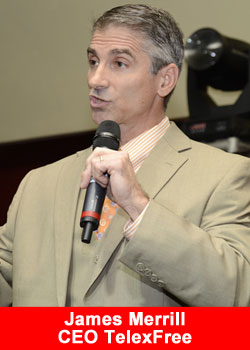TelexFree Receiver Stephen Darr Speaks Out

In 35 years of handling bankruptcy cases, Stephen Darr has seen plenty of ugly. He has doled out funds to creditors of an asbestos company and a machine gun maker and to victims of several Ponzi schemes.
But nothing comes close to the scale of the TelexFree Inc. bankruptcy. Never in history has a trustee been responsible for divvying up the assets of a company that prosecutors say defrauded 2.1 million people, from Boston to Uganda.
Darr, an accountant by trade and senior managing director at Mesirow Financial Consulting in Boston, is the court-appointed trustee charged with paying out claims to victims who believe they are owed more than $1 billion in the case. TelexFree was purportedly a long-distance phone company, but in reality generated most of its money by luring a stream of small investors from 2012 until it was shut down earlier this year, according to prosecutors.
Many Brazilian immigrants risked — and lost — large portions of their savings, in hopes of reaping the generous returns that were promised.
“I feel very sympathetic toward these people,’’ Darr said. “They lost a lot of money. They deserve to get it back, and it’s my job to get it back to them as quickly and as fairly as possible.”
He may have the toughest job in Boston right now: It will be virtually impossible to satisfy everyone.
Darr gets a half-dozen heart-rending e-mails a week from victims around the world who are wondering how and when they might get their money back. A professor from Ghana thanked him for his work and said she hoped for God’s intervention. A 21-year-old Framingham woman said her mother had fallen into a depression over her TelexFree losses. A man from Madeira Island, off the coast of Morocco, offered to show Darr around if he ever travels there.
TelexFree filed for bankruptcy protection in April, just before state and federal authorities raided its Marlborough office and filed civil fraud charges against the firm. Carmen Ortiz, the US attorney in Massachusetts, seized $150 million worth of assets from the company, including the cars and boats of one of its owners.
In Brazil, where TelexFree originated and was shut down in 2013, the authorities have frozen $350 million.
Basic math would mean each victim gets $238. But it won’t be that simple. Darr and his team must establish a claims process that verifies whether each person had a TelexFree account and how much money was lost while ensuring that a claim paid in Brazil is not also submitted in Boston. A bankruptcy judge in Worcester must approve the process in advance.
“There’s a lot of complexity to this,’’ Darr said, dramatically understating the case.
 And without a guilty verdict, there is no meaningful money for Darr to distribute. TelexFree’s two US-based owners are facing trial on criminal fraud charges. One of them, Carlos Wanzeler, fled to his native Brazil when the alleged scam collapsed, and is a fugitive, according to prosecutors. The other, James Merrill of Ashland, is home with a GPS tracking bracelet and a curfew. Both men deny the charges but could spend up to 20 years in prison if found guilty.
And without a guilty verdict, there is no meaningful money for Darr to distribute. TelexFree’s two US-based owners are facing trial on criminal fraud charges. One of them, Carlos Wanzeler, fled to his native Brazil when the alleged scam collapsed, and is a fugitive, according to prosecutors. The other, James Merrill of Ashland, is home with a GPS tracking bracelet and a curfew. Both men deny the charges but could spend up to 20 years in prison if found guilty.
In the meantime, the TelexFree victims must wait.
Darr, 68, works with two computer screens and a laptop on his desk, accounting manuals on his shelves, and a view of the harbor from his modest space in a Franklin Street office tower.
He is a Quincy native and a Boston College graduate, with an MBA from the University of Chicago and a penchant for fishing for salmon in northern Canada. He has spent his career in Boston, working for the accounting giant KPMG before it spun off Mesirow, his current employer.
He is well-known in Boston bankruptcy circles. Among other cases, he has handled claims related to feeder funds for Bernard Madoff. He is now serving as financial adviser to the trustee in the New England Compounding Center bankruptcy case, which is distributing a proposed $135 million to victims of the Framingham pharmacy involved in a 2012 meningitis outbreak.
Bankruptcy rarely produces happy stories for anyone. TelexFree is especially distressing because of the sheer number of victims, Darr said, many of them working people who lost significant savings. Some don’t speak English, and a portion are undocumented, so they are fearful of drawing attention to themselves.
“They’re salt of the earth, hard-working folks,’’ Darr said. “Many of the people don’t understand that it really wasn’t a business, that everything that was generated was really smoke and mirrors.”
In US Bankruptcy Court in Worcester, there were victims who pleaded with Judge Melvin S. Hoffman to let the trustee reopen the business, Darr said, as if there were a business to reopen.
Darr and two members of his Boston staff are combing through TelexFree’s data, and its accounting computer program, which runs in Portuguese and includes 1.3 billion customer transactions. Darr said he has subpoenaed records from banks, lawyers, and accountants and pored over about 200,000 documents to decipher how TelexFree operated and gathered money.
Ross Martin, a bankruptcy attorney and a partner at Ropes & Gray in Boston, said Darr is respected in his field.
“The key thing in some of these cases is a combination of accounting and information technology specialists, because they have to go in and look at the computer systems and look at the data and the contracts and piece all that together,’’ Martin said.
Darr’s office has received 29,000 paper TelexFree claims, many of them from early on in the case. But he is discouraging people from sending any more documents and wants the entire process to be electronic, for cost and efficiency’s sake.
“It’s too voluminous to process,’’ he said. Just to handle a hard-copy claim, photocopy it, and turn it into an online document costs about $10 a claim, he said.
“If you’ve got a million claims, that’s $9 million or $10 million” in expenses — and less money for victims. As in other bankruptcy cases, Darr and his colleagues will be paid out of the same pot of money as the victims.
Darr’s staff and a law firm he hired, Murphy & King, can earn up to $550 an hour for their work on the case. Darr himself can earn a maximum of 3 percent of the total funds distributed to victims and creditors. A judge must approve any of those payments.
Darr estimated that, at 10 minutes per claim, it would take eight years for one person working full time to process 100,000 claims. Instead, he envisions building a website that allows claimants to fill out an online form and get a quick response on whether they are eligible to receive money, and an estimate of how much that would be.
Nadine Cohen, head of the consumer rights unit at Greater Boston Legal Services, which provides legal assistance to low-income people, has been working with community groups like the Chelsea Collaborative to help provide information to TelexFree victims.
“The number of people is just overwhelming,’’ Cohen said. “Our interest is making sure that the lower-income people who really were at the bottom of the whole thing and never got any money back — to make sure that they’re filing claims.’’
She also is working with prosectors and Darr’s office to make sure undocumented people who were victims — sometimes losing their life savings on TelexFree — can submit claims without fear of reprisal.
“We want to make sure that everyone’s rights are protected,’’ Cohen said. “I think Stephen Darr has been very sensitive to these issues.”
In the end, Darr will have to oversee a process that treats everyone equally. A certified public accountant who asks for help getting $100,000 back is no higher in the pecking order than 60,000 South African victims recently brought to his attention by their lawyer, he said.
“We have to go through the process. I can’t play favorites,” Darr said. “I’ve got a duty to do.”
He said prosecutors share his concern for compensating victims as quickly and equitably as possible. “But they also have the concern of putting the bad guys in jail.”
Source: Boston Globe